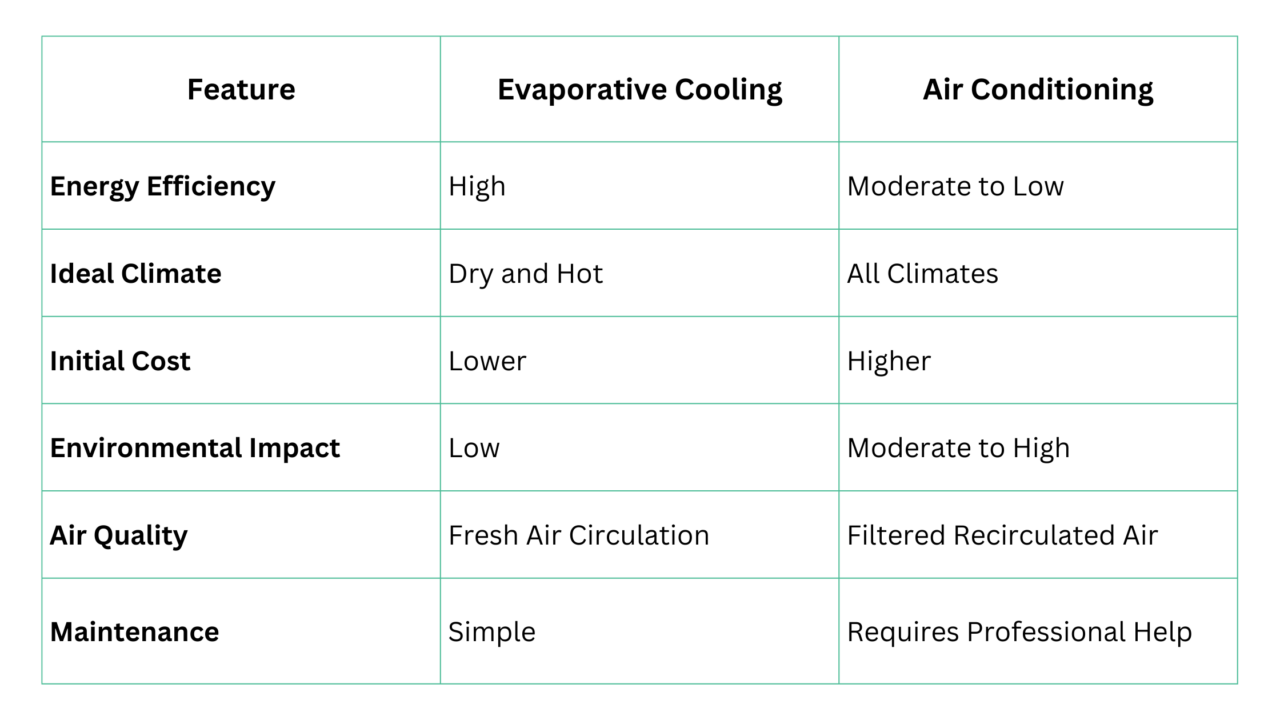As temperatures rise, finding the right cooling system becomes essential—whether you are managing a large industrial facility or simply trying to keep your home comfortable. Two popular solutions dominate the market: evaporative cooling and air conditioning (AC). While both are designed to beat the heat, they work very differently and suit different environments.

So how do you choose the right system for your needs? Let’s explore how each one works, compare their benefits, and help you make an informed decision.
What Is Evaporative Cooling?
Evaporative cooling uses the natural process of water evaporation to cool the air. It draws warm outside air through water-saturated pads. The water absorbs the heat and evaporates as the air moves through, bringing cold, humid air into the room. Evaporative air coolers consume 80-85% less electricity than any air conditioning.
Want to explore high-performance evaporative coolers for your facility or home? Check out our evaporative cooling solutions designed for both industrial and residential use.
Key Features:
- Best suited for dry, hot climates
- Low energy consumption
- Provides continuous fresh air flow
- Ideal for large open areas like warehouses, workshops, and rooftops
In industrial settings, evaporative coolers (also known as swamp coolers) are especially useful in spaces with large volumes and natural ventilation. In residential use, they are common in areas with low humidity where traditional ACs may be overkill or expensive to run.
What Is Air Conditioning (Refrigerated Cooling)?
Air conditioning systems use a refrigeration cycle. It absorbs and expels heat from interior air by circulating a chemical refrigerant, and then the system cools and dehumidifies the air before circulating it again.
Key Features:
- Works in all climate types, especially humid regions
- Precise temperature and humidity control
- Sealed, closed-loop operation
- Common in homes, offices, hospitals, and commercial setups
For residential users, AC systems offer comfort with consistent cooling, while in industrial sectors, ducted and central AC systems are used for controlled environments such as clean rooms, laboratories, and IT/server rooms.
Evaporative Cooling vs. Air Conditioning
1. Cooling Efficiency & Performance
- Evaporative Cooling: Best in hot, dry areas. Less effective in humid conditions.
- Air Conditioning: Performs well in all climates, including coastal or tropical zones.
2. Energy Consumption & Operating Costs
- Evaporative Cooling: Consumes less electricity than AC; great for reducing operating expenses in large spaces..
- Air Conditioning: Higher energy usage; electricity bills can rise significantly with continuous use.
3. Environmental Impact
- Evaporative Cooling: Eco-friendly, no refrigerants used. Requires water.
- Air Conditioning: Uses refrigerants that may have a carbon footprint; high power demand can strain the grid.
4. Installation & Maintenance
- Evaporative Cooling: Simple setup; lower installation cost. Needs regular water and pad checks.
- Air Conditioning: More complex and expensive installation. Requires periodic servicing of refrigerant lines and filters.
5. Air Quality & Health
- Evaporative Cooling: Introduces fresh air constantly; helps remove stale air and odors.
- Air Conditioning: Recirculates indoor air—great for filtration, but can dry out the air and trap indoor pollutants if not maintained.
Pros and Cons at a Glance

Which One Is Right for You?
Choosing the right system is not just about the unit—it is about how well it’s designed for your space. Our team provides custom HVAC design services to ensure optimal performance and energy efficiency tailored to your environment.
The right cooling solution depends on several key factors:
For Industrial Spaces:
- If you operate in a dry, hot region (e.g., central or western India), evaporative cooling offers a cost-effective, low-maintenance solution, especially for factories, warehouses, and workshops.
- For controlled environments like laboratories, pharmaceuticals, or tech spaces, where humidity must be controlled, air conditioning is the better fit.
For Residential Homes:
- In dry climates, evaporative coolers can provide effective relief at a fraction of the cost.
- In humid or coastal areas, or when you need precise temperature control (e.g., for babies, elderly), air conditioning ensures comfort and reliability.
Both evaporative cooling and air conditioning have unique advantages. Your decision should be guided by your climate, budget, space requirements, and energy efficiency goals.
At Degree Day Pvt. Ltd., we offer expert consultation and tailor-made HVAC solutions for both industrial and residential users. Whether you are building a new facility or upgrading your home, we help you choose the system that’s just right for your needs.
Still unsure? Contact us today to schedule a site visit or consultation with our HVAC experts.
Get in Touch
Please share your details below and we’ll get back to you soon.
